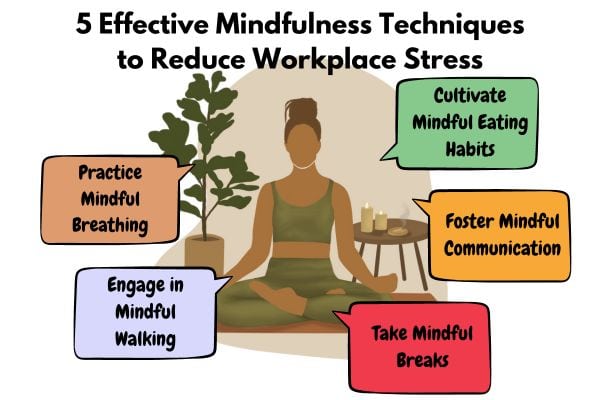“Almost everything will work again if you unplug it for a few minutes…Including you.” – Anne Lamott
Stress is normal, and dealing with it in a healthy manner is important.
In today’s fast-paced and demanding work environments, stress has become a ubiquitous part of our daily lives. From meeting tight deadlines to dealing with difficult colleagues, work-related stress could take a significant toll on our physical and mental health. The good news is that there are simple and practical mindfulness techniques that you could incorporate into your daily routine to help to reduce stress and enhance your overall well-being in the workplace. So, take a deep breath and let’s explore these effective mindfulness practices.
“Sometimes the most productive thing you can do is relax.” – Mark Black
1. Practice Mindful Breathing
One of the simplest and most accessible mindfulness techniques is mindful breathing. Taking a few moments to focus mindfully on your breath; the slow, rhythmic breathing could bring a profound impact on your stress levels. Find a quiet space, close your eyes, and bring your attention to your breath. Take a slow, deep breath in through your nostril, bring it all the way into your lower abdomen with the feeling of your belly expanding, and then exhale slowly through your mouth, let your body feel the relaxation. Repeat this breathing process for a few rounds, allowing yourself to fully immerse in the sensation of each breath and the feeling of relaxation. This simple practice could help calm your mind and reduce stress levels.
2. Engage in Mindful Walking
If you find yourself feeling overwhelmed at work, taking a short break and going for a mindful walk could be incredibly beneficial. Step outside and find a peaceful spot where you can walk without distractions. As you walk, focus on the sensation of your feet touching the ground and the movement of your body. This practice can help you get out of your head and into your body, reducing stress and anxiety.
3. Cultivate Mindful Eating Habits
Instead of scarfing down your lunch at your desk, take a few moments to practice mindful eating. Find a quiet corner, take small bites and chew your food slowly, paying attention to the taste and texture of each bite. Engage your senses and savor the experience of eating. Notice the colors, smells, and flavors of your food. This practice not only helps you be more present in the moment but also aids in digestion and reduces stress.
4. Foster Mindful Communication
When communicating with colleagues, practicing mindful communication could help reduce stress significantly and improve the quality of your relationships. Listening actively with full attention to what others are saying without interrupting, staying focused on the conversation, avoiding multitasking or checking your phone, could help to create a fruitful engaging interaction. By being fully present in your interactions, you can reduce stress and enhance your understanding and connection with others.
5. Take Mindful Breaks
In the midst of a busy workday, it’s crucial to take short breaks to practice mindfulness. Take a few minutes to refocus and recharge. Close your eyes, take a deep breath, and simply observe your thoughts and emotions. Allow yourself to let go of any stress or tension you may be carrying. This practice can help you reset your mind, increase your self-awareness, and reduce stress levels.
Additional Information:
Research has shown that the regular practice of mindfulness can have numerous benefits for individuals in the workplace:
- Reduce stress levels: Mindfulness helps to activate the body’s relaxation response, which reduces stress hormones and promotes a sense of calm and well-being.
- Improve focus and productivity: By training your brain to be more present and focused, mindfulness can enhance your ability to concentrate and complete tasks efficiently.
- Enhance emotional resilience: Mindfulness cultivates self-awareness and emotional intelligence, allowing you to better manage stress, regulate emotions, and respond to challenges with clarity and composure.
- Foster positive relationships: When you practice mindful communication, you develop better listening skills and empathy, leading to improved relationships and a more harmonious work environment.
Incorporating mindfulness into your workday does not have to be time-consuming or complicated. These simple practices can be integrated seamlessly into your routine and have a profound impact on your overall well-being.
Remember, taking a deep breath and engaging in these mindfulness techniques is not just a luxury; it is a necessity for maintaining your mental and emotional health in the face of work-related stress. So, start incorporating these practices today and experience the transformative power of mindfulness in the workplace.
“In today’s fast-paced work environment, it’s crucial to prioritize self-care and stress management. Incorporating mindfulness techniques in the workplace can help in reducing stress levels significantly and promoting overall well-being.”
Read our blog – Why Self-Care is Essential for Counsellors (And How I’ve Learned to Prioritise It)









